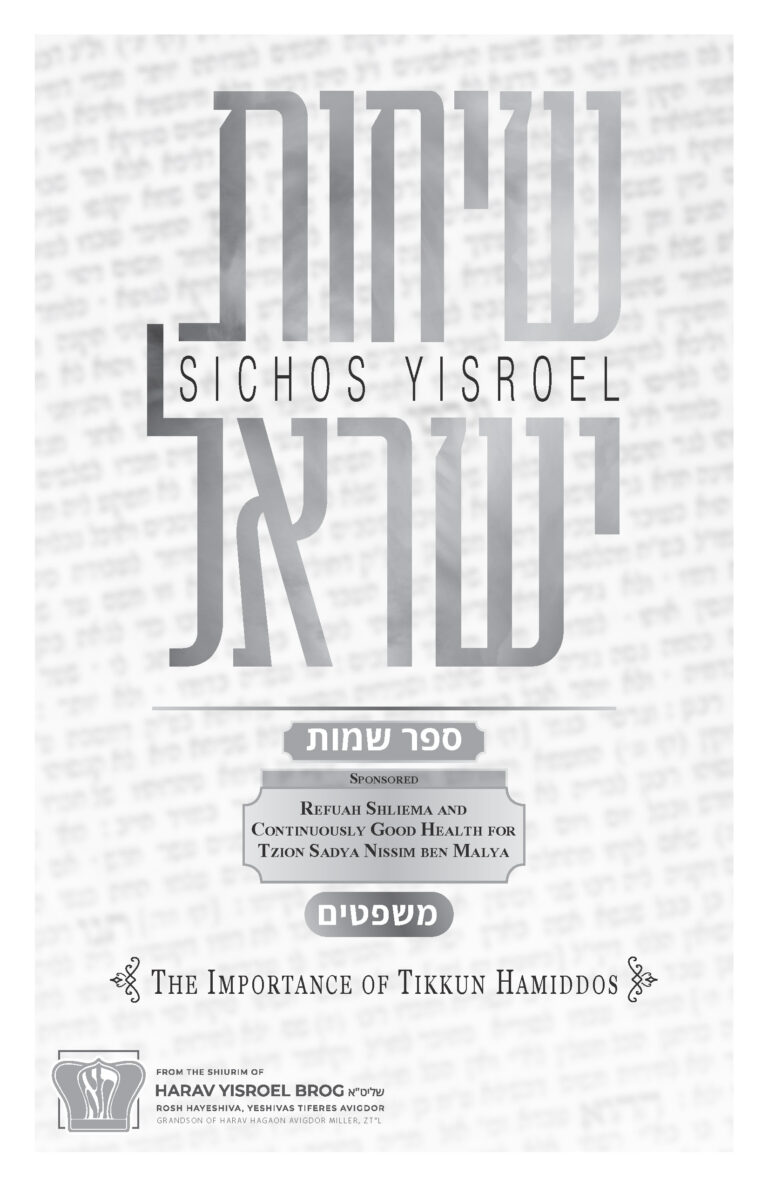Chukas-Balak 5783: What to Focus on in Chinuch – part 2
Sponsored
by Gavi & Tova Savitt: Hakaras Hatov to Hashem for Getting Married this Week!
Consider sponsoring a shiur
Visit YTATorah.org
Shiur presented in 5779
Also see Part 2: Shabbos Ben Zug (5771)
What Does it Mean to be a Talmid?
The foundation of being an ehrliche Yid and the foundation of somebody being a talmid of Avraham Avinu is based on having good middos (Avos 5:19).[i] And if you lack those good middos, then you’re one of the talmidim of Bilaam Harasha. He’s your rosh yeshivah, he’s your rebbi, and that is what you are drawn to.
Now, what is the meaning of being a talmid of Avraham Avinu? From what perspective would you say something makes a person be a talmid? What does this mishna in Avos mean when it says, “Anyone who has these three traits is a talmid of Avraham Avinu”? If you have these three things, you’re a talmid. Maybe you have some similarities, but what does it mean if it says you’re a talmid?
The word talmid implies that I gained something from the rebbi, I learned something from the rebbi. But if a guy works on these middos, does it mean that he learnt it from Avraham Avinu? No. Maybe he learned mussar sefarim and he had good parents who trained him well and now he has a good, sterling character. What does it mean that he’s a talmid of Avraham Avinu? It’s the same when a guy says he’s a talmid of a rosh yeshivah – he means he gained something directly from him.
There is a young man who is going out with a girl very seriously. In his resume, he says which yeshivah he learned in, and he says this to anybody who asks him. I called the rosh yeshivah and he says to me, “No one like that learned by me.” I said, “No, you’re kidding.” He said, “How many years ago was it? 10 years ago, 15 years ago?” I said, “No, 3 or 4 years ago.” “No, no, he didn’t learn by me.” I said, “He claims you’re his rebbi.” Nu, a good kasha? He said, “Maybe he was here for a few weeks and that’s why I don’t remember him.”
So in what way are you a talmid of Avraham Avinu?
Or if a guy says, “I’m a chassid of a certain rebbe,” so you go to his tischen. Maybe you adopt some of his minhagim, you go to him for brachos before Rosh Hashanah and Yom Kippur. What does it mean you’re his talmid? It’s a very funny lashon – “talmid of Avraham Avinu.” What does that mean? These are the ways of the Torah. I’m not doing it because of Avraham Avinu. I’m doing it because azoi shteit in the Torah, azoi shteit in mussar sefarim. Punkt Avraham Avinu also did this.
If I see two tzaddikim and one happens to have the same middah as the other. One is an old person, one is a young person. That means he’s his talmid? No.
So what I think it means is that Avraham Avinu’s derech drew him to do the ratzon of Hashem. Avraham Avinu’s middos drew him to become beloved by Hashem. Avraham Avinu’s middos made him represent Hashem. That is what it means to be a talmid.
Go Where Avraham Went
We say in every Shemoneh Esrei, “Elokei Avraham.” Avraham was an embodiment of the desired middos of Hashem. So what it means is, I think, is that if a person develops these three middos – because that is what the Torah wants of him – he is going to automatically follow and be led to the same place that Avraham Avinu was led in his avodas Hashem. We are going to end up walking in the footsteps of Avraham Avinu.
And if a person practices these three middos, even if he never heard of Bilaam, he’s going to end up exactly where Bilaam ended up. Where did Bilaam end up? In a big huge vat of boiling tzoia. That is where Bilaam ended up. And he goes from one ‘mikveh’ to the other ‘mikveh.’
When you go to some fancy chassidishe places, they have different kinds of mikvaos. They have a cold one, then they have a heise mikveh and then they have a kochedig. Bilaam switches from a vat of tzoia rosachas to a big vat of shichvas zera. Those are the mikvas he goes to. They are both very hot. That’s where you end up if you go in his footsteps. We have already discussed the middah of ayin tovah.
Nefesh Shefalah
Another middah tovah discussed in the mishna is nefesh shefalah. What does it mean to have a nefesh shefalah? Zogt Rabeinu Yonah (Shaarei Teshuva 1:34) nefesh shefalah means someone who has a nefesh, a neshamah that is healthy.[ii] What is a healthy nefesh or neshamah? A healthy neshamah is somebody, he says, that is not very desirous to do aveiros. That means, he’s working on himself or he purified himself from the middos ra’os, so that he doesn’t have a pull and a taavah for bad things. We all know that when people are younger and they are undeveloped, there is a tremendous turbulence going on inside of them. The turbulence always comes from something that leads them to feel unsettled. How does their unsettledness manifest itself?
If you meet an average bachur, you can see the fellow appears to be unsettled. Most people are not settled. They are not mature yet, they haven’t gotten to the right place yet. What do you know is going on with this bachur? You know what you know? That he doesn’t have a healthy neshamah. He has a turbulent soul. What is the nekudah, what is the point of that turbulence? He is mis’aveh, he desires tanugim, hana’os ha’olam and he is mis’aveh l’dvar aveirah. His neshamah runs away from him and he is controlled by his desires. To the degree that his desires control him, he doesn’t have a nefesh shefalah. When we say that Avraham had a nefesh shefalah, that means to say that his inner self was calm – and so he was content.
It’s amazing. I remember being in my late teen years and studying my elders: my zeide (Rav Avigdor Miller), my rebbi (Rav Meir Halevi Soloveichik), and my father (Rav Shmuel Elchonon Brog). I always had a thought that maybe an older person was really the same as the younger person, just either, they would slow down – their yetzer hara “evaporated” a little bit and they couldn’t “move” as fast, or they realized that they not going to get their dreams realized – or they controlled themselves a little more. I remember thinking, “Are these people different from another person? Are they actually different from younger people?” And on numerous occasions, I asked, I pried, I pressed and I was tremendously surprised to discover that – they really conquered their taavos.
To a great degree, the taavah that everybody else had, they really didn’t have. The average kid has a gevaldige taaveh. For example, he loves a nice car. Even a good kid. The average kid loves to go on vacations. The average kid loves good food. The average kid loves boatloads of fun. And they are really drawn to it. It’s not stam. When they can’t do it, they feel tremendous turbulence. When you tell them to sit down and do the right thing, they say, “I can’t sit so long, I can’t hear for so long. It’s too much learning.” Why do they talk this way? Because they are turbulent. This is coming from feeling a lack and seeking of abundant pleasures. They feel the lack and they feel driven.
And Avraham Avinu was somebody that lo hayah chafetz beta’anugim ubehana’os ha’olam klal. His yetzer hara didn’t have a shlitah on him. You know why? Because his nefesh was shefalah.
So as people start to develop and grow older and mature, so you hope or sometimes they hope, sometimes others hope, that they start to get content and they start to feel that the pursuit of nice things, geshmake zachen, olam hazeh is not something to pursue.
Taavah for Food and Wines
You find this with adults, as well. Over the last 20-30 years, the sugya of taavos has tried to outdo itself. You find this mainly in the area of pursuit of foods. People have no qualms about being attracted to eateries where they have to drop hundreds of dollars on one meal. And they have no qualms about it. No qualms! And what they are being served is chicken or meat. They are not being served something that was made in scienceland. It’s a peleh how people run after this. Frum people!
Another tremendous meshugas that caught on is kosher wine. People often purchase wines at a cost of hundreds of dollars a bottle. They join wine clubs. It’s lo ye’uman ki yesupar. This is the opposite of nefesh shefalah. That person is not capable of learning because his soul is turbulent – he’s from the talmidim of Bilaam, nebach. It’s an amazing phenomenon.
Ruach Nemuchah -וְאָנֹכִי עָפָר וָאֵפֶר
Then other middah Avraham Avinu had was ruach nemuchah. Avraham was a powerful human being. He was honored and revered by the masses. He was a נְשִׂיא אֱלֹקִים אַתָּה בְּתוֹכֵנוּ – “you are a prince of Hashem among us.” (Bereishis 23:6) He was viewed as the greatest of the greatest men – as a powerful warrior, as a powerful moral pillar, as an extremely wealthy man. And this same Avraham met those three people whom he thought were Arabs and what does he say? “I am your servant.” That’s a little much – I am your servant?! Could you imagine some workers outside, working for the city. They are almost completely unclothed. They are in the boiling hot sun outside and they are wearing shoes only so their feet don’t get burnt by the tar – otherwise they wouldn’t be wearing shoes. And they are out there, pouring hot tar and they look like they came out of some place that you can’t imagine where they even discovered these people. You want to be a tzaddik, you go out and you bring them a glass of water, maybe some cold ice water. They say, “Thank you, thank you.” Imagine a guy going out there and saying, “Could you please come into my home. I am at your service. You are my masters.” I mean, they’ll look at him like he’s crazy. I mean, what are you talking about? You? What’s the pshat?
That’s how Avraham kept himself, וְאָנֹכִי עָפָר וָאֵפֶר – “I am but dust and ashes” (Bereishis 18:27). Even for people whom he thought were Yishmaelim. He didn’t see himself necessarily as being in a higher position or not being able to serve mankind. He saw himself as having a responsibility.
Ayin Ra’ah
Regarding the middos of Bilaam Harasha, the first thing it says is he had an ayin ra’ah. Where do we see he had an ayin ra’ah? He said, “If Balak will give me מְלֹא בֵיתוֹ כֶּסֶף וְזָהָב.” (Bamidbar 22:18) He didn’t say, “Even if he will give mea house full of money, I can’t go with you.” He didn’t say that. You know what he said? “If you give me his house full of money.” So Chazal ask: “What was he looking at Balak’s house for?” Balak lived in a huge house. He was a melech. And Bilaam said, “I’m not thinking of a regular house full of money. I’m thinking of Balak’s house full of money. I wish I can get my hands on it. But I can’t – unless Hashem gives it. I’m in Hashem’s hands.” It means, he didn’t stam want money. He wanted other people’s money.
You ever go past a rich man’s house, you often see how people stop to look at the house. They say, “Wow, the money that must have gone into this house! Just imagine.” You see the outside, the porch, the lawn, and you think, “Wow, if I can only get my hands on this house somehow.” That is ayin ra’ah.
Nefesh Rechavah – Taavah
And then what is a nefesh rechavah? Rabeinu Yonah says, a nefesh rechavah is somebody who is the opposite of a nefesh shefalah. Which is amazing, because Bilaam was a brilliant man, he was an intellectual man. He was sought after for advice. He was a person of counsel. And when they came to him to ask him to curse Klal Yisrael, he thought of an idea of how to make Klal Yisrael be nichshol, how to bring down Klal Yisrael. So what does the guy say? He comes up with an idea that they should get the nations to undermine the keduashah of the Jewish people, to offer up their daughters, the best of their daughters. Rabeinu Yonah says, that’s the raya the guy was sunk in taavos. Only a baal taaveh would think of that idea. He was thinking about how he can get his hands on everybody’s daughters. That’s how he came up with a plot, give away your daughters, that will be the eitzah. And he was a noradik baal taavah.
Being Aware of What You Want to Change
So every one of us has to look into himself. It’s very scary when you start to look at your middos and you start to realize that you’re much stronger on the pathway of Bilaam than you are on the road to Avraham. And sometimes, as you get older, the road of Avraham doesn’t appear to be getting closer. It appears to be getting more distant, rachmanah litzlan. And you have to work on it. Each one of these middos, you have to work on them.
There is nothing wrong with a person telling himself, “Yes, I have a desire for hana’os of olam hazeh.” But if you don’t recognize that you have those desires, then you’ll never become better. You have to acknowledge it. And then you have to say to yourself, “Where am I going to start? Where am I going to begin? What am I willing to give up on?” It means to take it out of your mindset.
Kosher but Not Good Chinuch
Many people live completely in that mindset. They are just trying to juggle the balls and figure out how we can fulfill all our desires throughout the year. There are many people whose minds are completely focused on going to some island and going scuba diving and that is like shpitz olam hazeh. I’m not talking about a person who wants to get away and have some quiet time. I’m talking about a person who wants the geshmak of olam hazeh. You could have a person who goes to a hotel for Yom Tov and he’s going to get away. The zeide doesn’t feel good, the bobbe doesn’t feel good, and they could afford it, so they take the family to a hotel.
With others, it’s a matzav of, “So where are we going this year?” They look at the ads and they try to see which ad is going to attract them the most. So they look for ads about Pesach. Pesach is bizchus Avraham Avinu. Is this hotel going to bring me closer to Avraham Avinu? They look at the ads, at what they have to offer. This is where Bilaam would go. This is the place where a person can feel haughty, where a person can pursue all of his desires. And then they want to know why their kid has absolutely no interest in sitting and learning!
Now, even if you’re a guy who never went to a hotel, is there something else that a lot of people do? They read those ads and they get dreamy. They sit on their couch with the magazine – of course, a Jewish magazine – and they look at the back page. They show the picture of the sunset and the pool, the pool table, the water, maybe a ripple in the water, maybe no ripple. Beautiful cabanas, kosher poolside bar, scuba diving, skiing, jet skiing, and boating. Ah! That would be a Yom Tov mamash. And they talk about it to their kids and the kid hears the father or the mother thinking, “Oh, if only we could be zocheh to some day azah min zchiyeh. It would be like a shtickel taste of olam haba in this world.” So what does the son think? “When I get bigger, I’m going to go there as soon as possible.” And then he makes a phone call and he imagines he’s going there. He says, “I want to come, me and my wife.” “You want to come for the whole Yom Tov?” “Sure, why not?” “How much is that going to be, how much?” “You and your wife, I’ll give you a good deal. Ten grand.” “Ten grand, two people?!” “Yeah, that’s not for the main room in the main building. You have to get a room at the other end of the place. You have to walk. You’re young, right? You can afford to walk. What if you want a closer room and a fancier room? The pricing is going up.”
I was once in a hotel with a family and I asked the boss, “Tell me, what is the most that people dropped?” He said, “On one family, we made $80,000. On another family, $50,000.” Shreck! And that wasn’t a fancy place. There was no jet skiing and no scuba diving in that place. They had some farkrochene pond that had pond scum all over it.
A person has to realize what they are doing by dreaming of a Pesach like that and the message they are sending to their families. And if a person thinks that it’s not treif, because it’s got glatt kosher written on it, and it’s got chassidishe shechitah, it’s non-gebrokts and all kinds of things, it still is very problematic and you don’t realize the effect. It’s difficult to adequately describe the effects.
Pick the Right Rebbi – The Consequences are Everlasting
So each one of us has to check ourselves. We have to say, “Who are our rebbis and who are we educating our children to follow?” Because there are only two schools of thought. You are either in the school of Avraham Avinu or you are in the school of Bilaam Harasha.
The mishnah says, the talmidim of Bilaam Harasha are not going to end up in olam haba. But the talmidim of Avraham Avinu will be zocheh to olam hazeh and olam haba.
A person should really do some introspection and think about how preoccupied and how turbulent his neshamah is, or how settled his neshamah is. How content and how satisfied he is with what Hashem gave him in this world.
Hakadosh Baruch Hu should help us be talmidim of the right rebbi. Bilaam Harasha died when he was just 32 years old (Sanhedrin 106b). He didn’t make it. Chatzi yamav. His rishus didn’t get him anywhere. He understood that the Jewish way of life is ultimately the right way, because he said, “I would like to die an ehrliche yid.” He said that: תָּמֹת נַפְשִׁי מוֹת יְשָׁרִים (Bamidbar 23:10). He said, “I want to live like a goy but I want to die like a yid. I’ll live my life, I’ll get old, I won’t have any physical kochos anymore, I’ll have enjoyed myself, done what I wanted to do. When I can’t work anymore and my body is creaking and I can’t taste the food anymore, I can’t enjoy myself anymore, then I’m going to settle down in the elterer yahren, תָּמֹת נַפְשִׁי מוֹת יְשָׁרִים.”
But there is no such a thing. מי שטרח בערב שבת יאכל בשבת – One who prepares on erev Shabbos will eat on Shabbos (Avodah Zora 3a). When you look at a tzaddik, don’t think that he wasn’t at one time a child. Don’t think he didn’t have a turbulent soul when he was in his youth. A lot of great tzaddikim in their youth knew how to enjoy life and they appreciated the good life. They weren’t all ‘born in a cave.’ Not everybody was born into a family of tzaddikim and was an illui already when they were little. They were regular people and they worked on themselves. And they became content, they became humbled and they became focused and they lost their interest in olam hazeh until it meant nothing for them.
Halevai we should get there and be able to impart this to our children in some form and fashion, to our talmidim, so that they end up inheriting olam hazeh and olam haba.
The Bottom Line
Becoming a talmid of Avraham Avinu entails acquiring the middos of עַיִן טוֹבָה, וְרוּחַ נְמוּכָה, וְנֶפֶשׁ שְׁפָלָה, with the goal of drawing oneself to do the ratzon of Hashem, becoming beloved by Hashem, and representing Hashem in this world. Working on developing a נֶפֶשׁ שְׁפָלָה (a “content” soul, that does not have pull and a taavah for bad things), for example, involves, first, acknowledging that we desire pleasures of this world, and then, second, asking ourselves which tanugim and hana’os ha’olam we can minimize or even channel for Torah and Mitzvos instead. Whether one craves expensive restaurant foods or wines, fancy clothing or Pesach hotels, the process of tikkun starts by realizing that these temporary pleasures not only may lead to issurim, r”l, but they threaten our dedication to our own Yiddishkeit and send the wrong chinnuch messages to our children. We also learned that Shabbos is the soul of the whole week and that the world would not get its weekly renewal without Shabbos. Shabbos is the gateway through which Hashem rests His Presence on the world and is what allows the world to continue from week to week! On top of that, our own shemiras Shabbos determines the degree of access that each of us will have to that Shabbos-neshamah, and how much spiritual strength each person will have in all their aivorim, during the following week! This coming week, bli neder I will try to keep focused on the goal of spirituality and just once this week, I will choose to avoid one taanug of olam hazeh (e.g., leaving some food on my plate) even if it means I pretend I have lost interest in olam hazeh for the sake of the exercise.
Part II: Shabbos: The Concept of Ben Zug (5771)
Shabbos: The Purpose of the Creation
We have been speaking about the mussag that Klal Yisrael is the ben zug of Shabbos. Now Shabbos’ relationship to the world is brought out in the midrash. The midrash (Bereishis Rabbah, 10:9) points out וַיְכַל אלקים ביום השביעי מלאכתו אשר עשה – “On the seventh day Hashem completed the work that He had done.” (Bereishis 2:2) On yom hashvi’i HaKadosh Baruch Hu created a matzav of vayechal.[iii] Chazal say vayechal comes from the lashon of kallah and they give the following mashal. The mashal is of a מלך שעשה לו חופה, a king made for himself a chuppah, he painted it, he plastered it and he made it very fancy. ומה היתה חסרה – but what was lacking? כלה שתכנס לחופה. What was missing was a kallah who would enter the chuppah. The world had yom rishon, yom sheini, yom shlishi, מה היה העולם חסר? What was the world lacking? The answer is: Shabbos. That is what Chazal tell us. A chasunah without the pickles, nu, it’s oich a chasunah, it’s still a chasunah. Even without a fancy tablecloth, oich a chasunah. Of course, it makes it nicer if you have nice things, but it’s not me’akev, it doesn’t invalidate it. But a chasunah without a kallah is gornisht. Nothing.
The Maharal (Tiferes Yisroel 40:1) explains that the tachlis of the whole brias ha’olam is Shabbos, because Shabbos is what brings HaKadosh Baruch Hu into this world.[iv] Without Shabbos there would be no kallah. What does it mean there’s no kallah? It means that without Shabbos, it would not be shayach for us to get any connection or any shaychus to the presence of Hakadosh Baruch Hu. A Sunday without Shabbos is mamish like a chasunah with everything there except for the kallah. That’s what shtait in this Chazal. The way the kallah, which is HaKadosh Baruch, comes into the world (i.e. the maaseh of bringing in the kallah) – is by HaKadosh Baruch Hu making Shabbos. Vos iz der pshat?
“Placing” Shabbos Onto the World
This yesod really is already mentioned in a Rashba. The Rashba in Masechta Taanis (27a-b) says that once the world came to Shabbos and the world was already finished, it was ra’uy that HaKadosh Baruch Hu should rest His presence, should bring His presence and His glory into the world.[v] He says that’s the pshat וַיָּנַח ביום השביעי (Shemos 20:11). What’s the teitch of the word וינח? Everybody teitches וינח to mean, “He rested.” But the Rashba says that וינח is מלשון ותנח עליהם הרוח – it comes from the lashon of “and the spirit rested upon them” (Bamidbar 11:29), which means Hashem “put upon” the world, Shabbos. That’s what וינח means. It means it’s a chalos, it’s a pe’ulah of hanachah (an act of placing). Hashem was meini’ach the Shabbos. In every action of hanachah (placing) there’s an akirah (lifting an object). When the chefetz (object) is on the floor it’s called munach (it is placed); now it’s called nach. When the passuk says vayonach it is not describing the end result, it’s the peulah of vayonach. So it comes out that the world was the yesod, the foundation. Every day of the briah was the foundation for all the days that are represented by that day, and then וינח ביום השביעי. HaKadosh Baruch Hu was meini’ach His presence in the world through yom haShabbos. He says the Torah uses a term of vayinofash with regard to Shabbos – שָׁבַת וַיִּנָּפַשׁ (Shemos 31:17). Zogt der heilige Rashba what is the lashon over there of vayinofash? The word vayinofash indicates, he says, that when HaKadosh Baruch Hu was shovas – when HaKadosh Baruch Hu put Himself in the world – the result of that was vayinofash. First Hashem was shovas and the result of that was vayinofash. He says the lashon of vayinofash means וינפש מלשון ונפש ברכה תדושן. What the Rashba says here is amazing! That means to say that Shabbos is when the nefesh of the world was created. When Hashem created Adam’s body, He blew a neshamah into him, which completed the creation of Adam. Similarly, the Rashba explains that when Hashem created the world and all its components, it was incomplete until he blew a nefesh into it.
You have to know Shabbos is mamish the nefesh of the world, and just like a גוף בלי נשמה is gornisht, the world before Shabbos was like a גוף בלי נשמה. This is an amazing deher. Everything that Hashem created on the first, second, and the third day of maaseh Bereshis, until Shabbos came along, was like Adam before Hashem put the nefesh into him. So vayinofash means the world was mekabel a nefesh.
The Chiddush of Shabbos
We once mentioned the vort of the Ohr HaChaim.[vi] The Ohr HaChaim says that the kiyum of the briah is taluy on Shabbos because just like a guf cannot exist without its nefesh, the world cannot exist without Shabbos because Shabbos is the kiyum of the briah. This is a gevaldige chiddush. This is Ohr HaChaim’s chiddush. I wouldn’t have known this from the Rashba, because from the Rashba I could learn that on the first Shabbos Hashem put Shabbos in the world, and that is when Hashem blew it into the nostrils of the briah, and from that moment on, it always stayed there. Says the Ohr HaChaim, nein! Every single week Hashem has to be mechadesh the Shabbos. The koach of the kiyum of the briah, he says, is only for six days. The yom haShabbos brings the nefesh into the world and that is how the world exists for the next six days! The midrash says מה היה העולם חסר – what was the world missing? Menuchah. בא שבת בא מנוחה. Menuchah now means a chalos. That’s what menuchah means. It’s a chalos of the neshamah in the guf. When Hashem made Adam HaRishon and Adam HaRishon was lying there, the יציר כפיו (a creation of the Hand) of HaKadosh Baruch Hu, what was he missing? ויפח באפיו. He was missing a neshama. The world without Shabbos is also missing ויפח באפיו. And this aspect is mechayeh the velt.
So it comes out that Shabbos is the highest nekudah, the highest point in the mehalech of maaseh Bereshis. Just like the ויפח באפיו נשמת חיים was the highest point in the yetziras ha’adam, so too it is the highest point in the re-creation of the world every week. And this is what we say in davening on Friday night: אתה קדשת את יום השביעי לשמך – “You sanctified the seventh day for the sake of Your Name.” What does לשמך mean? To bring out Your hanhagah, that’s what shem Hashem is. תכלית מעשה שמים וארץ, that’s the tachlis. Without Shabbos, the world has no tachlis because the whole world was created for us to know Hashem, to bring out the kavod of Hashem. Without Shabbos there is no world. Without Shabbos there is no Hashem in the world. Just like without Hashem blowing into Adam his nishmas chaim, Adam wouldn’t get a tzelem Elokim and nishmas of HaKadosh Baruch Hu, the world also would not get its existence renewed without Shabbos. There’s no tachlis of the world without Shabbos. So too, Adam without a neshamah has no tachlis. We don’t say dayeinu on that, by the way. In dayeinu we say 15 dayeinus. It doesn’t say if HaKadosh Baruch Hu had created Adam and not done ויפח באפיו נשמת חיים דיינו. Dos nisht gezogt. So too, the world cannot exist without Shabbos.
So now you get a little insight, a little peek into why Shabbos is referred to as יומא דנשמתא. This is the neshamah of the world. This is what a mentch has to understand. You have to understand that every single Shabbos we are coming to a matzav of Hashem breathing into the world a new neshamah! We don’t all access that neshamah of Hashem equally, though. When a human being has a neshamah in him, does he have the same chiyus every day? No. Not all the aivorim (limbs) have the same chiyus. Some aivorim have more chiyus, some have less chiyus. You have to know it’s the same thing with the world. HaKadosh Baruch Hu blows into the world, puts a neshamah into the world and now each and every one of us has to access that present. To the degree that I access that neshamah, that is how much chaim I will have in all my aivorim, spiritually speaking, during the following week! Everything comes from Shabbos. The amount of brachah you could have comes from Shabbos; Shabbos is the mekor habrachah. Shabbos is the neshamah of the world, so to the degree that you tap into that neshamah when it is put into the world – a neshamah yeseirah, to that degree you will have chiyus and brachah. Neshamah yeseirah is not the same for everybody. Even for each individual, it’s not the same every week. It fluctuates to the degree that a person is holding. The measurement is to the degree that a person is associated with olam habo, to that degree he has a neshamah yeseirah. מי שטרח בערב שבת יאכל בשבת – one who prepares on erev Shabbos will eat on Shabbos (Avoda Zorah, 3a). You only get it if you are tarach on erev Shabbos. If a person doesn’t come prepared for Shabbos – let’s say, because he came late to be mekabel the Shabbos – he has not been mekabel the Shabbos (i.e. ol malchus shamayim). That’s why Shabbos is called שבת מלכתא.
When we say in לכו נרננה, we say לכו נרננה לה’ נריעה לצור ישענו- “Come, let us sing joyously to Hashem, raise our voice to our Rock and Deliverer”; נקדמה פניו בתודה – “Let us come into His presence with praise.” What are all these לכו נרננה’s about, what are all these pizmonim about? What it is saying over there is, with those pesukim we are trying to strengthen the tzad hakedushah as HaKadosh Baruch Hu is putting His neshamah into this world and is being mamlich Himself on the world, and what we are trying to say is: “HaKadosh Baruch Hu נקדמה פניו בתודה – “let us come into His presence with praise.” (Tehillim 95:2). We also say these lines: ה’ מלך, מזמור לדוד, ה’ עוז לעמו יתן, אנא בכח. These are mainly things you read in Tehillim, and they are all about our kabbalas malchus shamayim, our welcoming HaKadosh Baruch Hu and recognizing that everything in the world that we have was that original chuppah and now on Shabbos, we are experiencing the kenissah of the kallah under the chuppah. And if we will do that, be’ezer Hashem we will be zoche to have a shtikel taam, a shtikel yedi’ah in the יומא דנשמתא, the heilige Shabbos, and we should attempt to play our role as a ben zug of the Shabbos Kodesh.
[i] כָּל מִי שֶׁיֵּשׁ בְּיָדוֹ שְׁלשָׁה דְבָרִים הַלָּלוּ, מִתַּלְמִידָיו שֶׁל אַבְרָהָם אָבִינוּ. וּשְׁלשָׁה דְבָרִים אֲחֵרִים, מִתַּלְמִידָיו שֶׁל בִּלְעָם הָרָשָׁע. עַיִן טוֹבָה, וְרוּחַ נְמוּכָה, וְנֶפֶשׁ שְׁפָלָה, מִתַּלְמִידָיו שֶׁל אַבְרָהָם אָבִינוּ. עַיִן רָעָה, וְרוּחַ גְּבוֹהָה, וְנֶפֶשׁ רְחָבָה, מִתַּלְמִידָיו שֶׁל בִּלְעָם הָרָשָׁע. מַה בֵּין תַּלְמִידָיו שֶׁל אַבְרָהָם אָבִינוּ לְתַלְמִידָיו שֶׁל בִּלְעָם הָרָשָׁע. תַּלְמִידָיו שֶׁל אַבְרָהָם אָבִינוּ, אוֹכְלִין בָּעוֹלָם הַזֶּה וְנוֹחֲלִין בָּעוֹלָם הַבָּא, שֶׁנֶּאֱמַר (משלי ח) לְהַנְחִיל אֹהֲבַי יֵשׁ, וְאֹצְרֹתֵיהֶם אֲמַלֵּא. אֲבָל תַּלְמִידָיו שֶׁל בִּלְעָם הָרָשָׁע יוֹרְשִׁין גֵּיהִנֹּם וְיוֹרְדִין לִבְאֵר שַׁחַת, שֶׁנֶּאֱמַר (תהלים נה) וְאַתָּה אֱלֹהִים תּוֹרִידֵם לִבְאֵר שַׁחַת, אַנְשֵׁי דָמִים וּמִרְמָה לֹא יֶחֱצוּ יְמֵיהֶם, וַאֲנִי אֶבְטַח בָּךְ.
[ii] ואמרו רבותינו זכרונם לברכה כל מי שיש בו שלש מדות הללו מתלמידיו של אברהם אבינו. עין טובה. ורוח נמוכה. ונפש שפלה. ענין נפש שפלה. שאינו הולך אחר התאוה הגשמית גם בדברים המותרים. כמו שמצינו שאמר אברהם (בראשית י״ב:י״א) הנה נא ידעתי כי אשה יפת מראה את. שלא נסתכל בה עד היום ההוא להתבונן על תכונת יפיה. ואמרו רבותינו זכרונם לברכה במה שכתוב (שמואל ב כ׳:ג׳) ותהיין צרורות עד יום מותן אלמנות חיות. בכל יום היה דוד מצוה להיטיב את ראשן ונותן תמרוקים לקשטן. כדי להציק לתאותו ולהכניעה. באשר יכבוש יצרו מהן. למען יתכפר לו על דבר בת שבע, וכו’.
[iii] רַבִּי שָׁאֲלֵיהּ לְרַבִּי יִשְׁמָעֵאל בְּרַבִּי יוֹסֵי, אֲמַר לֵיהּ שָׁמַעְתָּ מֵאָבִיךָ מַהוּ וַיְכַל אֱלֹהִים בַּיּוֹם הַשְּׁבִיעִי, אֶתְמְהָא. אֶלָּא כָּזֶה שֶׁהוּא מַכֶּה בְּקוּרְנָס עַל גַּבֵּי הַסַּדָּן, הִגְבִּיהָהּ מִבְּעוֹד יוֹם וְהוֹרִידָהּ מִשֶּׁתֶּחְשַׁךְ. אָמַר רַבִּי שִׁמְעוֹן בֶּן יוֹחָאי בָּשָׂר וָדָם שֶׁאֵינוֹ יוֹדֵעַ לֹא עִתָּיו וְלֹא רְגָעָיו וְלֹא שְׁעוֹתָיו, הוּא מוֹסִיף מֵחֹל עַל הַקֹּדֶשׁ, אֲבָל הַקָּדוֹשׁ בָּרוּךְ הוּא שֶׁהוּא יוֹדֵעַ רְגָעָיו וְעִתָּיו וּשְׁעוֹתָיו, נִכְנַס בּוֹ כְּחוּט הַשַֹּׂעֲרָה. גְּנִיבָא וְרַבָּנָן, גְּנִיבָא אָמַר מָשָׁל לְמֶלֶךְ שֶׁעָשָׂה לוֹ חֻפָּה, וְצִיְּירָהּ וְכִיְּירָהּ, וּמָה הָיְתָה חֲסֵרָה, כַּלָּה שֶׁתִּכָּנֵס לְתוֹכָהּ. כָּךְ מֶה הָיָה הָעוֹלָם חָסֵר, שַׁבָּת. רַבָּנָן אָמְרֵי מָשָׁל לְמֶלֶךְ שֶׁעָשׂוּ לוֹ טַבַּעַת, מֶה הָיְתָה חֲסֵרָה, חוֹתָם. כָּךְ מֶה הָיָה הָעוֹלָם חָסֵר, שַׁבָּת. וְזֶה אֶחָד מִן הַדְּבָרִים שֶׁשִּׁנּוּ לְתַלְמַי הַמֶּלֶךְ, וַיְכַל אֱלֹהִים בַּיּוֹם הַשִּׁשִּׁי וַיִּשְׁבּוֹת בַּיּוֹם הַשְּׁבִיעִי, וכו’.
[iv] אמנם דעת גניבא ורבנן יש לך להבין מאד כי לדעת שניהם השבת עצמו הוא גמר מלאכה, ועל זה נאמר ויכל אלקים ביום השביעי מלאכתו אשר עשה. וזה כי אף אם לא היה המלאכה ביום השבת מכל מקום השבת הוא השלמת העולם, וזה כי השבת קראו חכמים בלשונם כלה כמו שאמרו בבבא קמא (ל”ב ע”ב) בואי כלה, ומה ענין כלה לשבת, אבל העולם הזה על ידי שבת יש לעולם חבור בו יתברך כי שאר ימים אינם מקודשים כמו השבת ומפני שהוא זמן קדוש יש לעולם חבור על ידו בו יתברך, ולכך נקרא השבת כלה שהיא עומדת להתחבר בבעלה וזהו השלמת העולם בודאי. ולכך מדמה דבר זה למלך שעשה חופה וציירה וכיירה והיה חסר כלה שתכנס לחופה להתחבר בבעלה, כך מה היה לעולם חסר שבת שהשבת הוא החבור בו יתברך. וזהו ויכל אלקים ביום השביעי מלאכתו אשר עשה, כי מלאכתו שהוא העולם כלה ביום השבת שקנה החבור הקדוש והדבוק העליון וזהו גמר מלאכת העולם, וכו’. (תפארת ישראל מ׳)
[v] כתב הרשב”א בחידושי אגדות בתענית (דף כז’ ע”ב) וז”ל: יש בזה נעלם ונגלה כבר ידעת שאף על פי שהיה יתברך יכול לברוא את העולם במאמר אחד חייבה בחכמתו לברוא אותו בז’ ימים, ולא היה העולם מלא עד סוף יום הששי, וביום השביעי היה העולם מלא, וע”כ נתברך כדכתיב ויברך אלקים את יום השביעי, לפי שהוא היה הראשון שנתברך ונתמלא העולם, וברכה לשון ריבוי ותוספות מל’ וברך את לחמך ואת מימיך, לפי שבו (בשם) [ביום] היה המילוי והריבוי והשלימות יתר על הימים השלמים הראשונים שעדיין לא היה העולם מלא, ועל כן נתקדש לפי שהיה עומד על השלימות ועל המילוי וראוי שישרה בו כבודו ותפארתו יתברך, והוא אומרו: וינח ביום השביעי על כן ברך ה’ את יום השבת ויקדשהו ,”וינח” מלשון – “ותנח עליהם הרוח”, והיו ימי הבריאה יסוד ודוגמא לכל ימות העולם ההווים אחריהם להיות כל יום פועל לדורות כפי הפעולה הנעשית בו בשבעת הימים הראשונים, וכו’. והוא המאמר בעצמו שאמר ר’ שמעון בן לקיש שבערב שבת נותנין לו לאדם נפש יתירה, והענין שימצא בו בנפשו תכונת רבוי ושלמות ועונג, וכמו שהיה ביום ההוא הראשון, ובעבור היום ההוא יחזור חלילה, והוא אומרו שבת וינפש, לומר כששבת ינפש העולם, וינפש מלשון נפש ברכה תדושן, ר”ל כי אז נבראת נפש העולם, ובדרך משל כאלו נפח נשמה לכלל העולם ועמדה יצירתו, וממנו כששבת ועבר אבדה הנפש ההיא וחזר חסר כח כביום דראשון, וע”כ אמרו שיריח עצי בשמים במוצאי שבת כדי לחזק הלב הטוב, לפי שהריח מענג הנפש ומחזקה, וכשיריח בסבת מצוה וברכה אז תהיה הפעולה חזקה וראויה לחזק הנפש באמת, עכ”ל.
[vi] ויכל אלקים וגו’. ונראה שיכוין הכתוב לומר על דרך אומרם ז”ל (חגיגה יב) כי העולם היה רופף ורועד עד שבאה שבת ונתקיים העולם ונתייסד. והכוונה הוא כי ביום שבת ברא ה’ נפש העולם והוא סוד אומרו וביום השביעי שבת וינפש. הגם שחז”ל (ביצה טז) דרשו כיון שיצא שבת וינפש, אין זה אלא דרך דרש שדרשו מאומרו וינפש ולא אמר ונפש דרשו כי נתכוון הכתוב לרמוז כיון שיצא שבת וי שאבדה הנפש אבל משמעות פשט הכתוב אינו יוצא ממנה שנתכוון לומר כיון ששבת פירוש בא שבת וינפש פירוש נשפע שפע החיוני בכל הנבראים כי קודם השבת לא היה נפש לכל הנבראים. וכן מצאנו לרז”ל בספר הקדוש זוהר התורה (תזריע מד.) שנתנו טעם למצות ה’ למול ביום השמיני ושלא לקרב קרבן לה’ עד יום הח’ כי הטעם הוא עד עבור עליו יום השבת ויהיה בעל נפש, וכו’. כי בו שבת מכל מלאכתו וגו’. צריך לדעת כוונת הכתוב במאמר זה. ונראה לפרש לפי מה שכתבנו למעלה כי העולם היה חסר הקיום עד שבאתה שבת ועמד העולם. ויש להעיר בזה שאותם ימים קודם שבאה שבת במה היה העולם עומד וכשם שהספיק לחיות באותן ימים בלא נפש השבת היה מתמיד והולך (אור החיים על בראשית ב׳:ב-ג׳)






